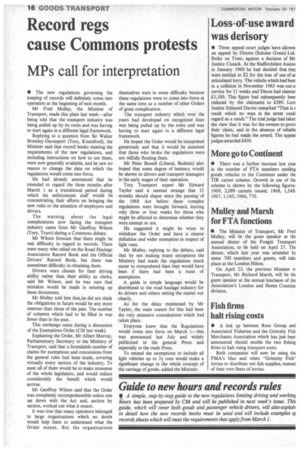Record regs cause Commons protests
Page 18

If you've noticed an error in this article please click here to report it so we can fix it.
MPs call for interpretation
• The new regulations governing the keeping of records will definitely come into operation at the beginning of next month. Mr Fred Mulley, the Minister of • Transport, made this plain last week—after being told that the transport industry was being pulled up by its roots and was having to start again in a different legal framework.
Replying to a question from Sir Walter Bromley-Davenport (Tory, Knutsford), the Minister said that record books meeting the requirements of the new regulations, and including instructions on how to use them, were now generally available, and he saw no reason to change the date on which the regulations would come into force.
He had already announced that he intended to regard the three months after March 1 as a transitional period during which his enforcement staff would be concentrating their efforts on bringing the new rules to the attention of employers and drivers.
The warning about the legal complications now facing the transport industry came from Mr Geoffrey Wilson (Tory, Truro) during a Commons debate.
Mr Wilson forecast that there might be real difficulty in regard to records. There were many who relied on the Road Haulage Association Record Book and the Official Drivers' Record Book, but there was sometimes difficulty in obtaining them.
Drivers were chosen for their driving ability rather than their ability as clerks, said Mr Wilson, and he was sure that mistakes would be made in entering up these documents.
Mr Mulley told him that,he did not think the obligations in future would be any more onerous than those of the past. The number of columns which had to be filled in was fewer than in the past.
This exchange came during a discussion of the Exemptions Order (CM last week).
Explaining the Order, Mr Albert Murray, Parliamentary Secretary to the Ministry of Transport, said that a formidable number of claims for exemptions and concessions from the general rules had been made, covering virtually every section of the industry. To meet all of them would be to make nonsense of the whole legislation, and would reduce considerably the benefit which would accrue.
Mr Geoffrey Wilson said that the Order was completely incomprehensible unless one sat down with the Act and, section by section, worked out what it meant.
It was true that many operators belonged to large organizations which no doubt would help them to understand what the Order meant. But the organizations themselves were in some difficulty because these regulations were to come into force at the same time as a number of other Orders of great complication.
The transport industry which over the years had developed on recognized lines was being pulled up by the roots and was having to start again in a different legal framework.
He hoped the Order would be interpreted generously and that it would be assumed that those who broke the regulations were not wilfully flouting them.
Mr Peter Bessell (Liberal, Bodmin) also hoped that some degree of leniency would be shown to drivers and transport managers in the early stages of their operation.
Tory Transport expert . Mr Edward Taylor said it seemed strange that 15 months should elapse since the passing of the 1968 Act before. these complex regulations were brought forward, leaving only three or four weeks for those who might be affected to determine whether they were exempt or not.
He suggested it might be wiser to withdraw the Order and have a clearer definition and wider exemption in respect of light vans.
Mr Mulley, replying to the debate, said that by not making many exceptions the Ministry had made the regulations much easier to comprehend than they would have been if there had been a mass of exemptions.
A guide in simple language would be distributed to the road haulage industry for its drivers and others setting the matter out clearly.
AS for the delay mentioned by Mr Taylor, the main reason for this had been the very extensive consultations which had taken place.
Everyone knew that the Regulations would come into force on March 1—this was announced last July and widely publicized in the general Press and especially in the trade Press.
To extend the exemptions to include all light vehicles up to 3+ tons would make a significant change in the whole concept of the carriage of goods, added the Minister.














































































































































































































